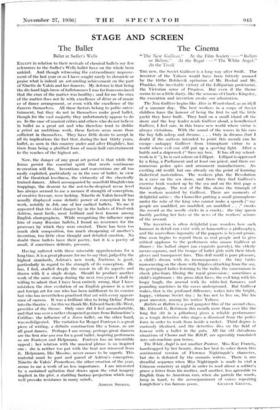" The New Gulliver." At the Film Society " Bullets
or Ballots." At the Regal —" The White Angel." At the Tivoli
THE new, the Soviet Gulliver is a long way after Swift. The inventor of the Yahoos would have been bitterly amused by the blithe Bolshevik optimism of Mr. Roshal and Mr. Ptushko, the inevitable victory of the Lilliputian proletariat, the Victorian sense of Progress. But even if the theme seems to us a little dusty, like the sermons of Charles Kingsley, the execution and invention awake our admiration.
The New Gulliver begins like Alice in Wonderland, us an idyll of a summer day. The best workers in a corps of Soviet children have the honour of being the first to sail the little yacht they have built. They land on a small island off the shore and the boy leader reads Gulliver aloud, a bowdlerised Gulliver, I feel sure, in this brave new world where virtue is always victorious. With the sound of the waves in his ears the boy falls asleep and dreams. . . . Only in dreams (but I doubt if the authors intended to point this moral) can he escape—unhappy Gulliver —from triumphant virtue to a world where evil can still put up a sporting fight. After a battle and a shipwreck (" Save my box. It has all my school- work in it "), he is cast ashore on Lilliput. Lilliput is oppressed by a King, a Parliament and at least one priest, and there are numerous police spies and armament manufacturers. An exciting old world, but one already on the point of learning dialectical materialism. The workers plan the Revolution in a cave on the sea shore, and there they find Gulliver's exercise book washed up by the sea and on the first page a Soviet slogan. The rest of the film shows the triumph of the workers assisted by Gulliver. There are moments of delightful satire : the Chancellor putting a small gramophone under the robe of the king who cannot make a speech (" my people are muddled, are muddled, arc muddled . . ." creaks the record as the needle sticks in a crack) ; the tiny queen hastily packing her hats at the news of the workers' seizure of the arsenal.
The invention is often delightful (one wonders how such humour in detail can exist with so humourless a philosophy), and the marvellous ingenuity of the puppets is beyond praise. One soon begins to regard them as real people and to give critical applause to the performers who amuse Gulliver at dinner : the ballad singer (an exquisite parody), the elderly mezzo-soprano, and the troupe of ballet girls with their black gloves and transparent fans. This doll world is pure pleasure, a child's dream with its inconsequence : the tiny tanks manoeuvring on the shore with frigates attacking from the sea, the periwigged ladies listening to the radio, the cameraman in check plus-fours filming the royal procession ; sometimes a child's nightmare : the gross idiot faces, the evil king with his loopy laugh, the arsenal with its white-hot furnaces and pounding machines in the caves underground. But Gulliver wakes, that is the profound difference, wakes into the bright, happy, virtuous Soviet day ; he has not to live on, like his poor ancestor, among his native' Yahoos. • Bullets or Ballots is a good gangster film of the second class. Mr. Edward G. Robinson (his 'mouth more than ever like the tong flat slit in a pillarbox) gives a reliable performance as a tough detective who stages a dismissal from the police force in order to work from inside a racket. Third degree is 'curiously idealised, and the detective dies on the field of honour with a bullet in the guts. All the old chivalrous situations of Chums and the B.O.P. are agreeably translated into sub-machine gun terms.
The White Angel is not another Pasteur. Miss Kay Francis, handicapped by her beauty, does her best to sober down this sentimental version of Florence Nightingale's character, but she is defeated by the scenario writers. There is one dreadful sequence when Miss Nightingale is made to visit a Crimean cemetery at night in order to read above a soldier's grave a letter from his mother, and another, less agreeable to English than' to American ears, when she patrols the wards, lamp in hand, to the accompaniment of voices repeating Longfellow's too famous poem. GRAHAM GREENE.














































 Previous page
Previous page